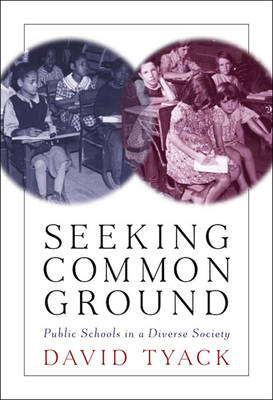
- Afhalen na 1 uur in een winkel met voorraad
- Gratis thuislevering in België vanaf € 30
- Ruim aanbod met 7 miljoen producten
- Afhalen na 1 uur in een winkel met voorraad
- Gratis thuislevering in België vanaf € 30
- Ruim aanbod met 7 miljoen producten
Zoeken
€ 47,45
+ 94 punten
Omschrijving
The American republic will survive only if its citizens are educated--this was an article of faith of its founders. But seeking common civic ground in public schools has never been easy in a society where schoolchildren followed different religions, adhered to different cultural traditions, spoke many languages, and were identified as members of different "races."
In this wise and enlightening book, filled with vivid characters and memorable incidents that make history but don't always make history books, David Tyack describes how each American generation grappled with the knotty task of creating political unity and social diversity. Seeking Common Ground illuminates puzzles about democracy in education and chronic conflicts that continue to make news. Americans mistrusted government, yet they entrusted the civic education of their children to public schools. American history textbooks were notoriously dull, but they were also highly controversial. Although the people liked local control of schools, educational experts called it "democracy gone to seed" and campaigned to "take the schools out of politics." Reformers argued about whether it was more democratic to teach all students the same subjects or to tailor curriculum to individuals. And what was the best way to "Americanize" immigrants, asked educators: by forced-fed assimilation or by honoring their ethnic heritages? With a broad perspective and an eye for telling detail, Tyack lets us see that debates about the civic purposes of schools are an essential part of a democratic culture, and integral to its future.Specificaties
Betrokkenen
- Auteur(s):
- Uitgeverij:
Inhoud
- Aantal bladzijden:
- 256
- Taal:
- Engels
Eigenschappen
- Productcode (EAN):
- 9780674024205
- Verschijningsdatum:
- 1/04/2007
- Uitvoering:
- Paperback
- Formaat:
- Trade paperback (VS)
- Afmetingen:
- 142 mm x 210 mm
- Gewicht:
- 244 g

Alleen bij Standaard Boekhandel
+ 94 punten op je klantenkaart van Standaard Boekhandel
Beoordelingen
We publiceren alleen reviews die voldoen aan de voorwaarden voor reviews. Bekijk onze voorwaarden voor reviews.











